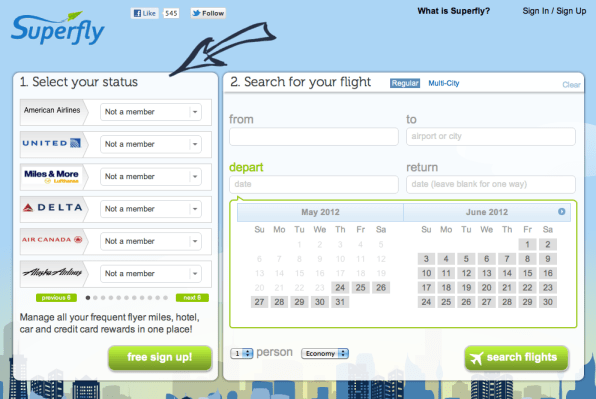While it’s far from being the only offender, the online travel industry (particularly travel search engines) is in dire need of better segmentation and targeting — for offers, deals, and all their related services. For example: Currently the top 10 percent of travelers are responsible for 40 percent of revenue and 50 percent of the profit in the industry, yet, generally speaking, they still see the same promotions and deals as everyone else.
In fact, Orbitz, Kayak, American, United, and a handful of other top travel sites still get most of their flight inventory info from ITA, which they sort and serve based on price, i.e. the cheapest ticket. Yes, cheap tickets are appealing, but if we’re looking for that which characterizes the next generation of travel sites — like the proliferation of user data profiles, personalization and granularity — then the experience demand more than basic price comparison. (Plus, let’s be honest, the cheapest ticket doesn’t always offer the best value, anyway.)
Today, Israeli startup (now based in Palo Alto) Superfly, which offers a secure tool that combines worldwide flight information with personal travel preferences to help people organize and maximize the value of their travel rewards among other things, is quietly launching a shot across the bow of the industry’s giants — in this case, the uber popular metasearch engine, Kayak.
That’s because the startup is now able to call on the significant operational and financial experience of Willard (Bill) Smith, who was, until recently, Kayak’s CFO. Smith joined Kayak in May of last year (as the company’s first-ever CFO) to help the startup prepare for and actually move forward with its perpetually-delayed IPO.
What do we mean by “perpetually delayed”? Well, Kayak first filed its IPO docs in November 2010, and it was reported last week that the company may, just may, embark on its road show next week. Why has it taken a year-and-a-half? The answer varies depending on whom you ask, but it would be safe to point a finger at both the long-running unsteadiness of IPO market conditions and the company’s erratic earnings.
As to Smith and Superfly, the CFO officially stepped down from Kayak in March, and although he declines to reveal the reasons behind his departure, he has definitely been clear about his growing interest in Superfly. Regardless of how one paints the CFO’s departure from the most popular (but erratically performing) metasearch engine for travel pre-IPO, along with his ensuing interest in advising a next-gen travel search engine that could spell trouble for that very incumbent (although a number of pieces would need to fall into place before one could consider Superfly a legitimate threat) — but in the end it would just be speculation and innuendo.
However, it is fair to say that the above, alongside Smith’s genuine interest, equates to some great early validation for Superfly (especially as it’s operating in a crowded space where startups have to work even harder to stand out), and at the very least implies that there could be significant opportunity for travel sites that can improve upon the Kayak model. As to Superfly, Smith said of its value proposition:
Superfly is a fresh take on a common task — travel search — and while other sites may offer good results for a broad base of travelers, Superfly gets YOU the best results based on how YOU travel.
Superfly first debuted at TechCrunch Disrupt SF in 2010 and later launched its flight search beta. Today, the startup is taking another step forward, with the official removal of its “beta” tag, finally making its flight search tools available to non-users.
Travel search right now is in the process of being commoditized, the former Kayak CFO says, which unfortunately results in users being treated the same way — as a commodity. However, a new generation of startups is emerging that will leverage Big Data to collect and create segmented profile data on its users to better target ads and offers to elite travelers.
For frequent fliers, earning miles and an elite status is the result of hard work, so Superfly aims to provide value by making it easy for them to organize their rewards and find flights that consider their frequent flier status. As the space stands today, 95 percent of travel search lacks segmentation and Superfly wants to help change that.
Of course, without creating value for airlines, this line of thinking means nothing. That’s why the startup is looking to tailor its approach in such a way as to transform the entire dynamic between channel and supplier from one of cutthroat competition (by showing results based on fares or distance) to one of value for both the consumer and supplier, Smith says.
With Superfly’s new tools, suppliers can now leverage its aggregated traveler data to provide valuable offers and promotions to the most influential and active members of its user base, and, in turn consumers will be able to receive these offers by joining Superfly and beginning their travel search. From there, Superfly’s suppliers can begin targeting their elite customers as they search, providing offers, deals, and more in realtime — at times when they are most useful.
Superfly also recently integrated with Facebook’s Open Graph to allow its users to share their achievements to their Facebook pages. While social functionality is essential, the real winner both Smith and Superfly CEO Jonathan Meir said, will go beyond intent to build meaningful customer profiles based on social activity, travel interests, and more.
For more on Superfly, check ’em out at home here.
